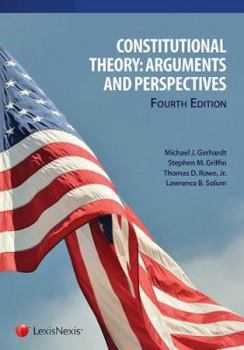Constitutional Theory: Arguments and Perspectives
Select Format
Select Condition 
Book Overview
This text covers the central debates in contemporary American constitutional theory and demonstrates the connection between theory and judicial practice, politics, and academic scholarship. This foundation prepares students to analyze the events in which constitutional theory is likely to play a significant role, such as Supreme Court confirmations proceedings, separation of powers conflicts, and constitutional interpretation and political disputes regarding civil rights and civil liberties. Among the changes in the Fourth edition: All chapters have been updated to reflect the current state of constitutional theory; Completely new chapters on: constitutional change; conservatives and constitutional theory; progressives and constitutional theory; and the US Constitution and global constitutionalism; New editor Lawrence Solum produces a state of the art chapter on originalism.; Throughout, selections present opposing views to make students aware of existing conflicts and to facilitate discussion. A Teacher's Manual is available to professors.
Format:Paperback
Language:English
ISBN:0769865194
ISBN13:9780769865195
Release Date:December 2013
Publisher:LexisNexis
Length:500 Pages
Weight:1.65 lbs.
Customer Reviews
1 rating
Accessible theory
Published by Thriftbooks.com User , 23 years ago
This really is a first class book - and worth every cent of its modest price. Although, as its title suggests, it is likely to appear on the reading lists of consitutional law professors, it also deserves a place on the bookshelf of the student of jurisprudence.The format is basically that of a conventional law school reader - however, this is an unusually good one. The theory side of constitutional law all too often takes second place to the minutiae of case law and development of constitutional doctrine. Law students often query the purpose and relevance of theory. This book is there to remind us that paradigm shifts in the law are more likely to be founded in new theory than in doctrine.The book is divided into four sections: Why Theory?, Sources, Perspectives, and Conclusion. The readings are chosen with exceptional skill and are prefaced by introductions from the editors and have conclusions that invite the reader to reflect on what one has read. Each chapter concludes with a very helpful bibliography to direct further reading on the topic.To my mind the most useful section of the book is the Perspectives section. This deals with liberal constitutional theory, conservative constitutional theory, feminist legal theory, critical race theory, and interpretation theory and postmodernism. The last three perspectives are difficult ones to encapsulate briefly but the editors have succeeded in identifying illuminating readings that are accessible to students. The chapter on critical race theory is particularly commendable.A book such as this is specially useful for students looking for a perspective from which to critique doctrine but who don't know where to start. I wish I had had access to a book like this when I was a law student!





